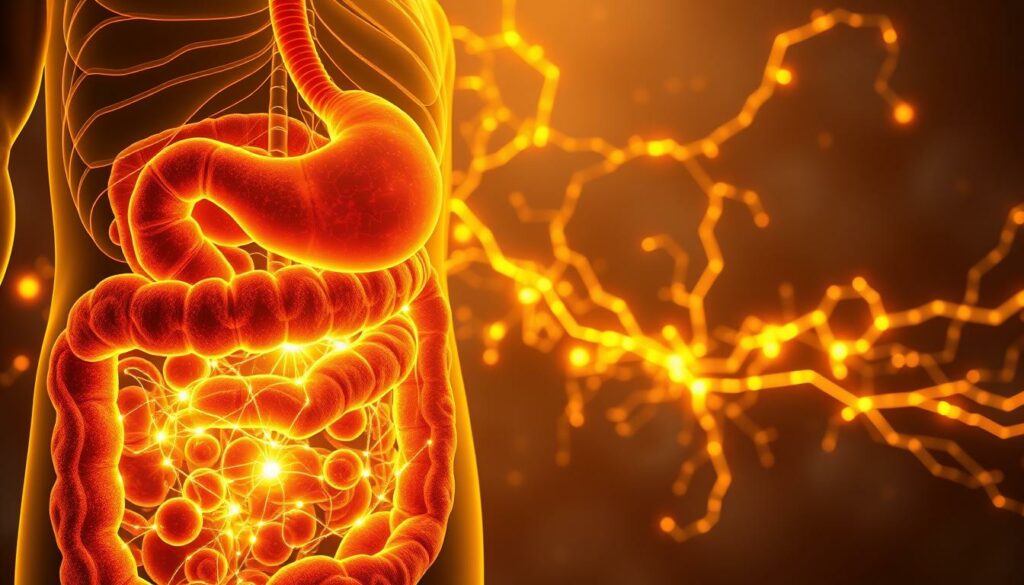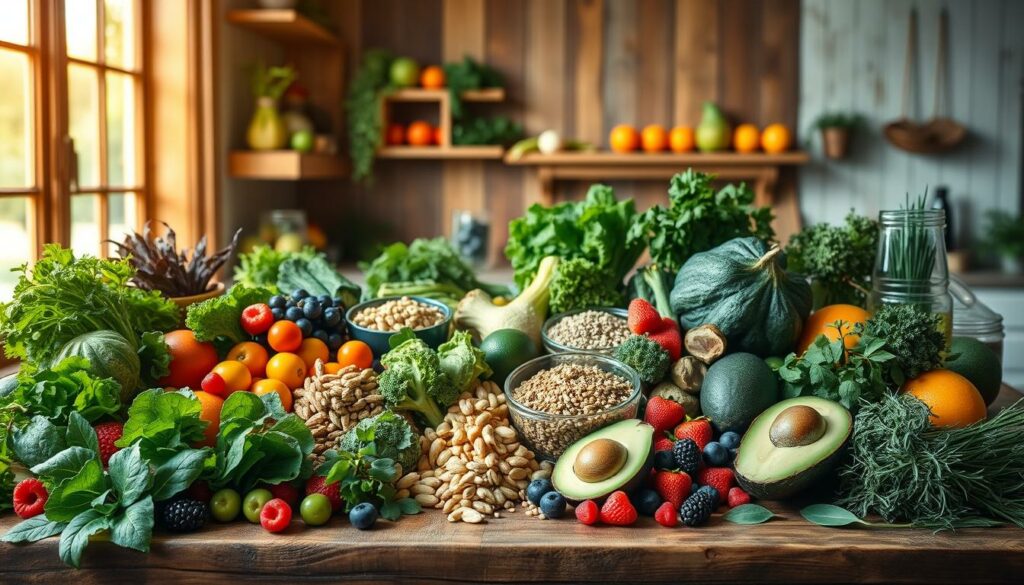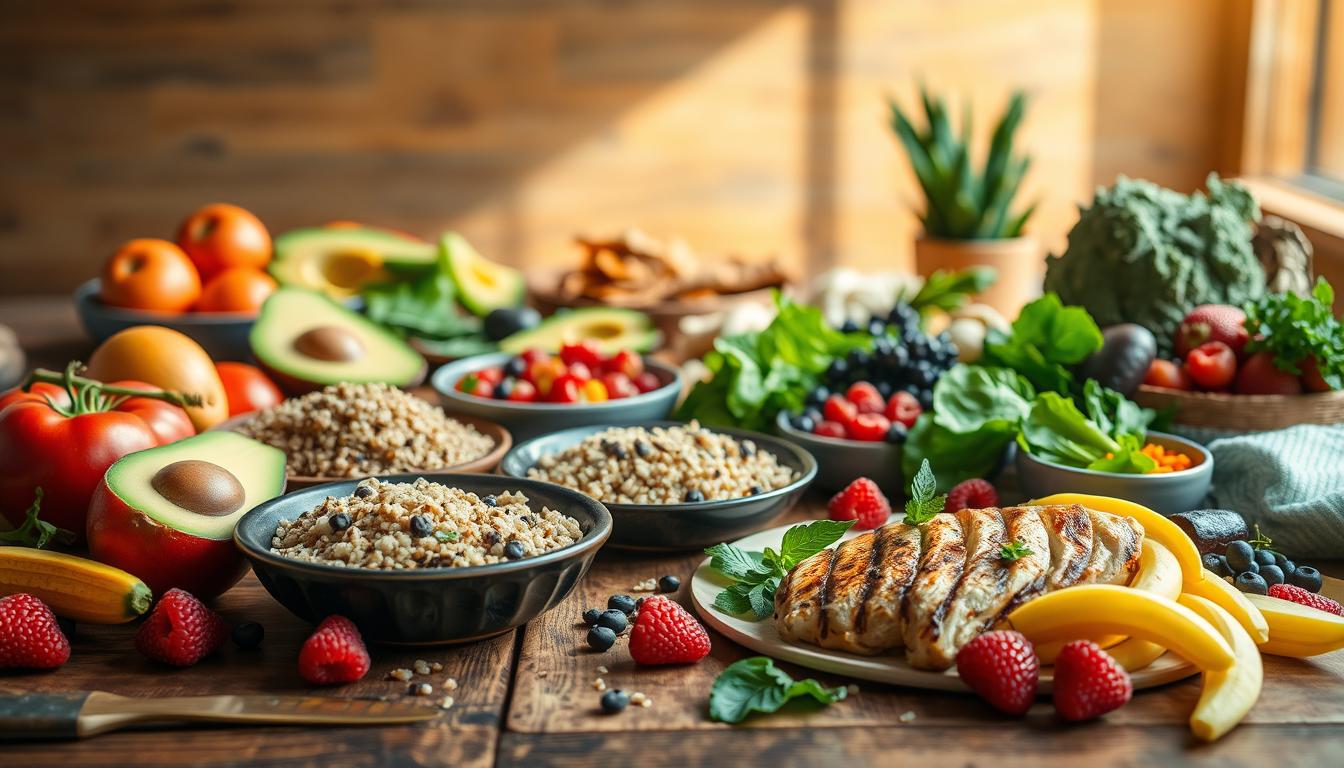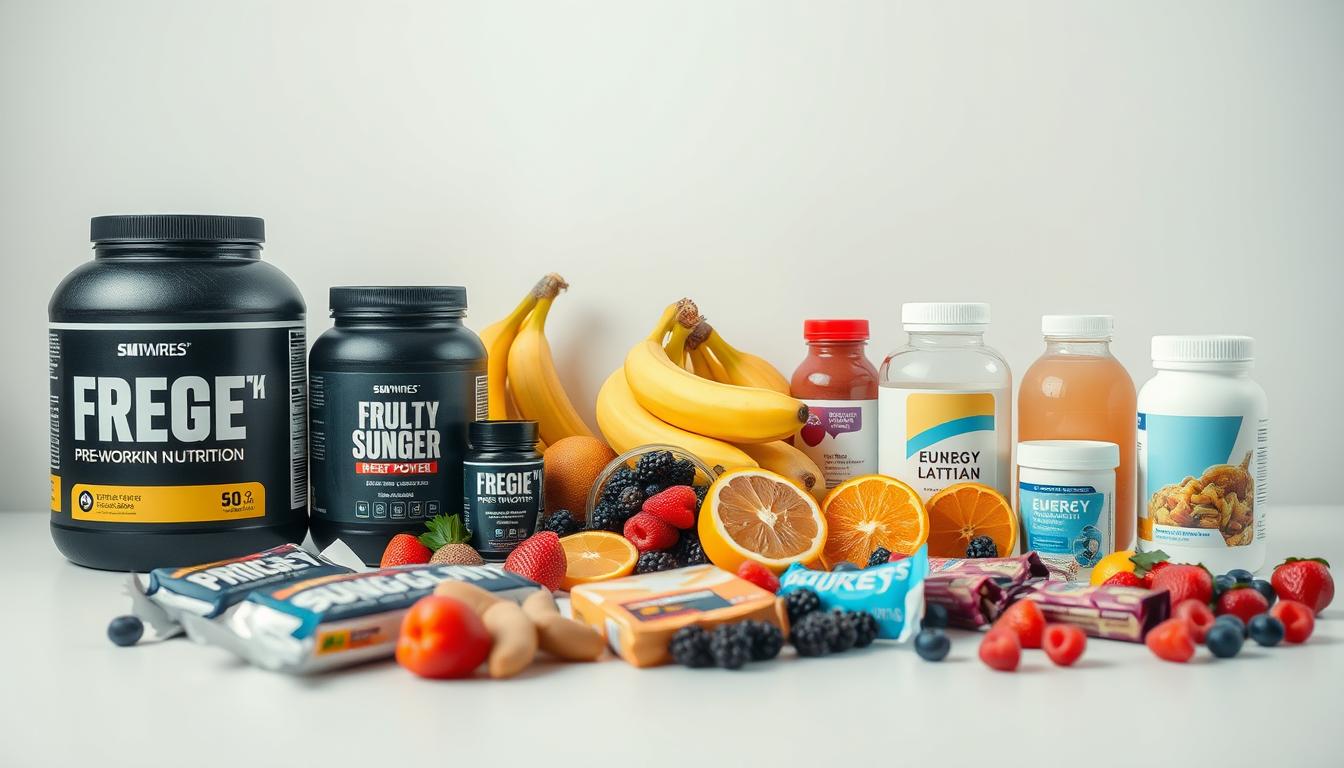Are you tired of feeling sluggish and drained all day? Do you struggle to keep up with your busy schedule? As we move into 2025, it’s key to know how balanced nutrition boosts your energy.
With the right foods, you can boost your energy and feel better overall. This article will show you how to do this by diving into the science of food and energy.
Key Takeaways
- Understand the role of balanced nutrition in maintaining optimal energy levels.
- Learn how different foods impact your energy.
- Discover practical tips for incorporating energy-boosting foods into your diet.
- Explore the science behind food and energy.
- Develop a personalized approach to fueling your body right.
The Science of Food and Energy
To boost your energy, it’s key to know how your body uses food. The process of turning food into energy is complex. It involves many mechanisms working together to power your day.
How Your Body Converts Food to Energy
When you eat, your body breaks down nutrients into energy through metabolism. Carbohydrates, proteins, and fats are the main energy sources. Carbohydrates turn into glucose, which powers your cells.
The Metabolic Process and Energy Production
The metabolic process has stages like digestion, absorption, and cellular respiration. In cellular respiration, glucose turns into ATP, your cells’ energy. A balanced diet is crucial for efficient energy production.

Bioavailability: Getting the Most Energy from Your Food
Bioavailability is how well your body uses nutrients from food. Cooking methods and digestive health can impact it. For example, cooking some veggies can make their nutrients easier to use.
Knowing how your body uses food can help you eat better. This improves your energy and supports healthy eating habits for your daily needs.
- Eat a balanced diet with complex carbs, proteins, and healthy fats.
- Choose foods with high bioavailability for better nutrient use.
- Stay hydrated to help your metabolism.
Key Nutrients That Power Your Day
To power through your day, you need more than just any food. You need nutrient-rich choices. Your body needs complex carbs, proteins, healthy fats, and essential vitamins to stay energized.
Complex Carbohydrates: Your Body’s Primary Fuel
Complex carbs are your main energy source. Foods like whole grains, legumes, and veggies give you energy slowly. Try energy-boosting meals like oatmeal with fruits or whole-grain toast with avocado.
Proteins: The Building Blocks of Sustained Energy
Proteins help keep and repair tissues, like muscles. These are key for energy. Eat protein-rich foods like lean meats, fish, eggs, and dairy to keep your energy up.
Healthy Fats: Long-lasting Energy Sources
Healthy fats are important for a balanced diet. They give you long-lasting energy. Nuts, seeds, avocados, and olive oil are great sources. They also help you absorb vitamins.
Micronutrients That Optimize Energy Metabolism
Micronutrients, like vitamins and minerals, are crucial for energy. Iron, vitamin B12, and magnesium are especially important. Eat a variety of fruits, veggies, and whole grains to get these nutrients.
To keep your energy up, eat a balanced diet. Include complex carbs, proteins, healthy fats, and micronutrients. Here are some foods to add:
- Whole grains like brown rice and quinoa
- Lean proteins such as chicken and fish
- Vegetables like spinach and broccoli
- Nuts and seeds, including almonds and chia seeds

Fuel Your Body Right: Understanding Meals for Energy in2025
In 2025, knowing about nutrition science is key to keeping energy up. Modern life is complex, and staying updated on nutrition is vital. This helps us find the best ways to keep our energy levels high.
Nutrition Science Breakthroughs of the 2020s
The 2020s have brought big changes in nutrition science. We now know more about how nutrients affect our energy. Personalized nutrition is a big focus, with research showing it’s important to match diets to our genes and metabolism.
The role of gut health in energy is also being studied. A healthy gut is key for good energy. This has made people interested in probiotics and prebiotics as energy boosters.
AI-Driven Personalized Nutrition Planning
Artificial intelligence (AI) is changing nutrition by making personalized nutrition planning possible. AI looks at our diet, health goals, and genes to create meal plans that boost energy.
Biometric Feedback and Meal Timing
Biometric feedback is helping us time our meals better. It lets us eat when our body needs it most. This way, we can keep our energy up.
Sustainable Energy Foods Trending in 2025
In 2025, people want foods that are good for the planet. They’re choosing sustainable energy foods like plant-based proteins, ancient grains, and foods grown using regenerative methods.
| Food | Energy Benefit | Sustainability Factor |
|---|---|---|
| Quinoa | Complex carbohydrates for sustained energy | Water-efficient crop |
| Lentils | High protein for energy and repair | Nitrogen-fixing, reducing fertilizer need |
| Almonds | Healthy fats for long-lasting energy | Regenerative agriculture practices |
By following these trends and eating sustainable foods, we can boost our energy. We also help make the food system better for the planet.
Morning Meals That Jumpstart Your System
Your morning meal is key to your energy and day’s performance. A good breakfast boosts energy, sharpens focus, and keeps you healthy.
The Optimal Energy Breakfast Formula
Making the perfect breakfast means mixing carbs, proteins, and fats. This mix gives you steady energy and keeps you full until lunch.
A good breakfast might have:
- Complex Carbohydrates: Whole grain toast or oatmeal
- Protein Source: Eggs, Greek yogurt, or nuts
- Healthy Fats: Avocado, nuts, or seeds
5 Quick High-Energy Breakfast Recipes
Here are some quick, healthy breakfasts to boost your energy:
- Overnight oats with nuts and fruit
- Avocado toast with scrambled eggs
- Greek yogurt parfait with granola and berries
- Smoothie bowl with spinach, banana, and almond milk
- Whole grain waffles with almond butter and sliced banana
Chrononutrition: Timing Your First Meal
Chrononutrition says eating when your body wants to can boost energy. Eating breakfast soon after waking starts your metabolism.
Morning Supplements Worth Considering
Some supplements can add to your breakfast’s energy benefits. These include:
| Supplement | Benefits |
|---|---|
| Vitamin B12 | Boosts energy production and supports nerve function |
| Iron | Essential for transporting oxygen to cells, supporting energy production |
| Magnesium | Plays a crucial role in energy production and muscle function |
Adding these tips to your morning routine can greatly improve your energy. This sets you up for a productive day.
Midday Refueling Strategies
To avoid the post-lunch dip, it’s vital to adopt effective midday refueling strategies. Refueling in the middle of the day is crucial to maintaining energy levels and supporting productivity.
Lunch Compositions That Prevent Afternoon Slumps
A well-composed lunch can help prevent afternoon slumps. Include a balance of complex carbohydrates, proteins, and healthy fats to provide sustained energy. For example, a meal consisting of whole grain bread, lean turkey, and avocado can offer a satisfying and energy-boosting lunch.
Strategic Snacking for Sustained Energy
Strategic snacking is essential for maintaining energy levels between meals. Choose snacks that are rich in nutrients and low in added sugars. Some energy-boosting snack options include:
- Nuts and seeds
- Fresh fruits
- Energy bars made with wholesome ingredients
- Protein-rich yogurt
The 90-Minute Energy Cycle: Timing Your Intake
Understanding the body’s natural energy cycle can help you time your meals and snacks more effectively. The 90-minute energy cycle suggests that the body experiences fluctuations in energy levels throughout the day. By eating in alignment with this cycle, you can maintain more consistent energy levels.
Office-Friendly Energy Boosters
In addition to meal planning, there are several office-friendly energy boosters that can help maintain energy levels. These include:
- Taking short walks outside
- Doing stretching exercises at your desk
- Using essential oils like peppermint or citrus
- Drinking plenty of water throughout the day
By incorporating these midday refueling strategies into your daily routine, you can maintain your energy levels and support your overall productivity.
Evening Nutrition for Recovery and Next-Day Energy
Evening nutrition is more than just filling your belly. It helps your body recover and gets you ready for the next day. The right nutrients are key to this process.
Recovery-Focused Dinner Compositions
A balanced dinner is crucial for recovery. It should have complex carbohydrates, lean proteins, and healthy fats. Whole grains and veggies refill glycogen stores. Lean proteins help muscles heal. Healthy fats, like those in nuts and avocados, keep energy levels stable.
Foods That Promote Quality Sleep
Some foods can improve sleep quality, boosting next-day energy. Tryptophan-rich foods, like turkey and chicken, boost serotonin. This helps you sleep better. Melatonin-rich foods, like cherries, also help regulate sleep.
The Ideal Dinner Timing Window
Eating too close to bedtime can mess with sleep. Eating too early might make you hungry late at night. Try to eat dinner 2-3 hours before bedtime for better digestion and sleep.
Evening Habits That Affect Morning Energy
Evening habits also affect morning energy. Avoid screens before bed and keep your bedroom cool. Relaxation techniques can also improve sleep and morning energy.
By focusing on balanced nutrition and healthy habits in the evening, you can recover better. This leads to better sleep and more energy in the morning.
Hydration: The Overlooked Energy Source
Hydration is a key player in energy production, working quietly to keep your body running smoothly. It’s more than just a drink to quench your thirst. Water plays a vital role in how your body uses energy.
Water’s Role in Cellular Energy Production
Water is crucial for turning nutrients into energy in our cells. Even a little dehydration can make you feel tired. It affects how well you work and feel overall. Experts say, “Drinking enough water keeps our body fluids balanced, which is key for cell function” (
Nutrition and Metabolism Journal
).
Electrolytes and Their Impact on Energy
Electrolytes like sodium, potassium, and magnesium help keep our fluids in check. They’re important for our nerves and muscles, keeping us energized. Not having the right balance can cause tiredness, muscle cramps, and lower performance.
Energy-Enhancing Beverages Beyond Water
While water is the best drink for staying hydrated, other drinks can help too. Green tea, for example, has antioxidants that help with hydration and give a natural energy lift.
Hydration Timing Throughout Your Day
Drinking water at the right times boosts your energy. Drink water when you wake up, before meals, and before, during, and after exercise. This keeps your hydration levels up all day.
Meal Prepping for Consistent Energy Levels
Keeping your energy up all day is easier with meal prep. Plan and prepare your meals ahead of time. This way, you’ll eat nutrient-rich foods that keep you energized.
7-Day Energy Meal Prep Blueprint
Make a 7-day meal plan with foods that give you energy. First, think about what you need and like to eat. Then, pick meals that have complex carbs, proteins, and healthy fats.
Here’s a simple meal prep plan:
- Breakfast: Overnight oats with nuts and fruits
- Lunch: Grilled chicken with quinoa and veggies
- Snacks: Apple slices with almond butter, energy balls from oats and nuts
Batch Cooking Energy-Dense Foods
Batch cooking saves time and makes healthy foods. Cook big batches of grains, proteins, and roasted veggies. Use them in different meals all week. This keeps you healthy and saves time.
“Meal prepping is a powerful tool for maintaining energy levels. By having healthy, energy-rich foods prepared in advance, you can avoid relying on convenience foods that often lack nutritional value.” – Nutrition Expert
Storage Solutions for Maximum Nutrient Retention
Storing food right keeps its nutrients. Use airtight containers and keep them cold. Glass containers are great for storing and reheating.
Time-Saving Preparation Techniques
Make meal prep quicker with these tips:
- Prepare ingredients in bulk
- Use a slow cooker for meals that simmer all day
- Get ready for the next day the night before
Follow these meal prepping tips to stay energized and healthy.
Adapting Your Nutrition to Different Energy Demands
To perform at your best, you need to adjust your diet based on your energy needs. Your body’s energy needs change with your activity level, mental tasks, stress, and travel. Knowing how to adjust your diet for these changes can greatly improve your performance and health.
Fueling for High-Intensity Physical Performance
For intense physical activities, your body needs specific nutrients. Complex carbohydrates give you long-lasting energy. Proteins help repair muscles. Make sure to eat a balanced meal with these nutrients 1-3 hours before your activity.
Nutrition for Extended Mental Focus
For tasks that need long mental focus, certain foods help keep your mind sharp. Foods like omega-3 fatty acids in salmon and antioxidants in berries support brain health. Also, drinking plenty of water is key for staying focused.
Adjusting Intake During High-Stress Periods
When you’re under a lot of stress, your body might need more nutrients. Vitamin C and magnesium can help reduce stress. Eating foods like dark chocolate, which has flavonoids, can also help.
Travel Nutrition: Maintaining Energy Away from Home
Traveling can mess up your usual diet and energy levels. To stay energized, drink plenty of water and eat nutrient-dense snacks like nuts and dried fruits. Planning your meals ahead can also help you get the right nutrients, even when you’re away from home.
Common Energy-Draining Nutrition Mistakes
Many people unknowingly make nutrition mistakes that lead to fatigue and low productivity. These errors can affect your well-being in big ways.
Hidden Energy Zappers in Your Diet
Some foods can really drain your energy. Foods high in sugar and refined carbohydrates can cause big energy drops. Knowing about these foods is key to healthy eating habits.
The Blood Sugar Roller Coaster Effect
High-glycemic foods make your blood sugar spike and then crash. This leaves you feeling tired. Eating low-glycemic foods helps keep your energy steady.
Timing Errors That Affect Energy Levels
Eating at odd times or skipping meals messes with your energy. Eating regularly helps keep your energy up.
Portion Control Missteps
Eating too much or too little can harm your energy. Getting the right portion size is crucial for balanced energy.
Being aware of these mistakes can help you fix them. This can boost your energy and overall health.
Conclusion: Creating Your Personalized Energy Nutrition Plan
Now that you know how food affects your energy, it’s time to make a plan. This plan will help you fuel your body right for 2025. By using what you’ve learned, you can create a diet that meets your energy needs.
To make your plan, first figure out how much energy you need each day. Then, find out which nutrients give you that energy. Think about your lifestyle, what you like to eat, and your health goals.
By learning to meal prep and adjust your diet for different energy needs, you can keep your energy up. Avoiding foods that drain your energy is also key. Start making your personalized energy nutrition plan today.


